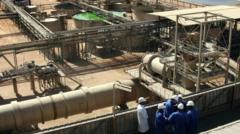Amid significant economic challenges and Western scrutiny, President Putin emphasizes military priorities at a key economic event, showcasing Russia's struggle to attract foreign investment while continually facing the repercussions of war and sanctions.
Putin's Pledge Amid Economic Struggles: Russia's Dual Challenges

Putin's Pledge Amid Economic Struggles: Russia's Dual Challenges
At the St Petersburg International Economic Forum, conflicting narratives of military ambition and economic hardship unfold as Russia grapples with the impact of ongoing sanctions.
At the St Petersburg International Economic Forum, an intriguing encounter unfolded as a Russian MP posed a provocative question about potential military action against Iran. This brief exchange underscored a prevailing anxiety at the forum, reflecting that discussions were not limited to economic concerns.
During the event, President Vladimir Putin delivered a keynote address centered on economic progress, yet his comments during a subsequent panel drew notable attention. As he asserted, "Where the foot of a Russian soldier steps, that’s ours," the juxtaposition of military rhetoric against a backdrop of eager economic discussions raised eyebrows.
Since the outset of the conflict in Ukraine, Russia's economic agenda has increasingly taken a backseat to wartime imperatives. Although the economy has been on an upward trajectory, this growth is chiefly attributed to heightened military spending, a situation that appears unsustainable as growth begins to slow.
Despite the concerns, Putin projected an air of confidence regarding the state of the Russian economy, employing the phrase—"rumours of my death are greatly exaggerated"—to dismiss mounting apprehensions. Nonetheless, the unease among government officials was palpable; Russia's Minister of Economic Development warned of an impending recession, while the Central Bank Governor highlighted dwindling resources.
Originally, the St Petersburg Forum was intended to serve as a showcase for Russian economic potential, yet the introduction of extensive sanctions has tarnished this image significantly. Many Western corporations have exited the Russian market, leaving a void in foreign investment that remains precarious at best.
Even with ambitions for renewed relationships, industry leaders are hesitant. Kirill Dmitriev, a presidential envoy for foreign investments, noted interest from American companies, yet he acknowledged that substantial engagement would hinge on a resolution to the Ukraine conflict. Robert Agee from the American Chamber of Commerce reiterated this, citing ongoing assessments of sanctions' impacts on businesses, leaving the question of Western corporate presence in Russia resting on the uncertain political climate.
As Russia continues to navigate multiple economic hurdles—including inflation and stagnation—the broader implications of warfare and sanctions loom large, complicating any prospects for immediate recovery.





















